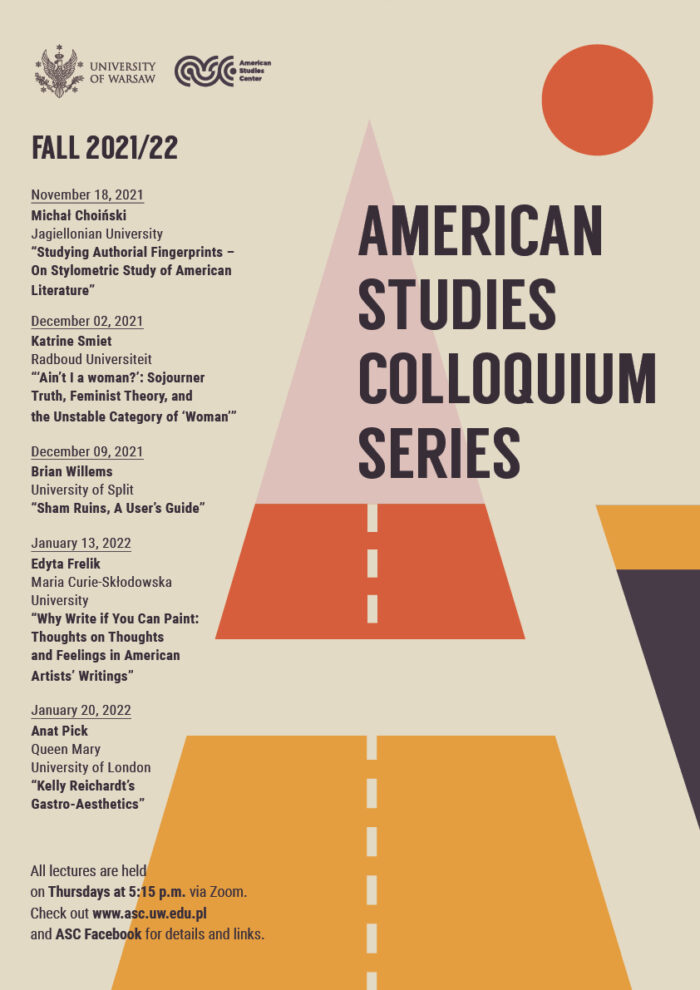We are pleased to announce an online lecture by
Edyta Frelik
(Maria Curie-Skłodowska University in Lublin)
Why Write If You Can Paint? Thoughts on Thoughts and Feelings in American Artists’ Writings
This lecture is going to be the a part
of the 2021/2022 Fall Edition of the
American Studies Colloquium Series.
Thursday, January 13, 2022
at 5:15 p.m.
You can get 2 OZN points for participating in this event.
Check how to collect OZN points online here.

poster by Joanna Bębenek
Where?
This lecture will be streamed online. To attend, click the button below or enter https://us02web.zoom.us/j/85476130234 into your browser, and join the meeting.
What?
The theme of this talk was prompted by an exchange I recently had with an American artist, who, having answered positively my question regarding whether she also wrote, immediately qualified her admission by saying: “But I’m not a good writer.” The disclaimer did not surprise me as there are many examples of artists who, on the one hand, openly acknowledge they feel an irresistible urge to write and, at the same time, admit they often experience unease, self-doubt, even impropriety or shame, feeling like trespassers on premises reserved for writers. And yet, the history of artists’ writings is long and rich—in fact richer than one might think based solely on who and what gets published or publicized. The spectrum ranges from those who enthusiastically and confidently, and sometimes audaciously, embrace writing as their second, but by no means secondary, profession to those who not only are much more ambivalent about their writing skills but, perhaps more importantly, are also doubtful about the legitimacy, purposefulness and efficacy of their literary efforts. One thus has to pose the question: Why write at all (if you can paint)?
In this talk I will cite a number of American artists whose texts offer clues about their motivations and goals as writers. My main point regarding the evolution of artists’ and critics’ ideas about the relation between the plastic arts and literature is that poetry played a key role in the course of the development of avant-garde art because for many leading modernists it provided a way to overcome the historical split between thought and feeling.
Who?
Edyta Frelik is assistant professor in the Department of British and American Studies at Maria Curie-Skłodowska University in Lublin, Poland. She teaches American art, history, popular culture, mass media, and film. Her essay “Ad Reinhardt: Painter-as-Writer” won the 2013 Terra Foundation for American Art International Essay Prize. As part of the award, she lectured at the Archives of American Art (operated by the Smithsonian Institution in Washington, D.C.) and her prize-winning essay was published in the Fall 2014 issue of the Smithsonian journal American Art. She was also invited by art critic and historian Barbara Rose to contribute an essay on Ad Reinhardt to the special Reinhardt issue of the magazine The Brooklyn Rail celebrating the artists centenary in 2013. In 2015, in collaboration with professor Jerzy Kutnik, her academic mentor, she organized “Wordstruck: American Artists as Readers, Writers and Literati,” an international conference made possible by a major grant from the Terra Foundation for American Art. In 2019 she was invited to contribute to a catalogue accompanying the first European retrospective exhibition of Marsden Hartley’s work at the Louisiana Museum of Modern Art in Denmark. She is the author of Painter’s Word: Thomas Hart Benton, Marsden Hartley, and Ad Reinhardt as Writers (Peter Lang 2016) and Kiedy malarz pisze (jak się patrzy). Wstęp do badań nad pisarstwem artystów (UMCS Press 2021). Her current research focuses on the persistence of anti-intellectualism in American public discourse, especially as related to the perception (including self-perception) and status of artists in the United States from the early 20th century to the present. She is the recipient of the 2021 NCN Miniatura5 grant funding for her project “Intellectualism and Anti-intellectualism in American Modernists’ Statements and Writings.”




